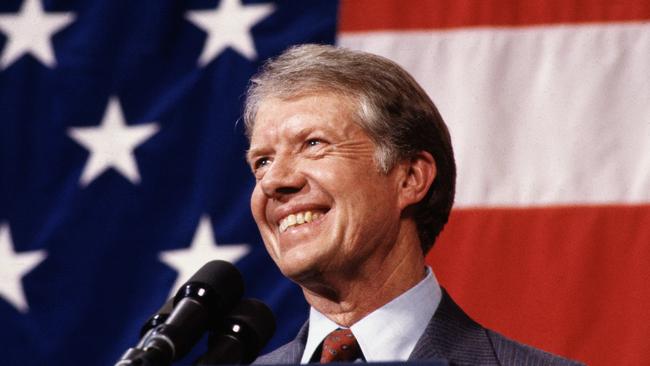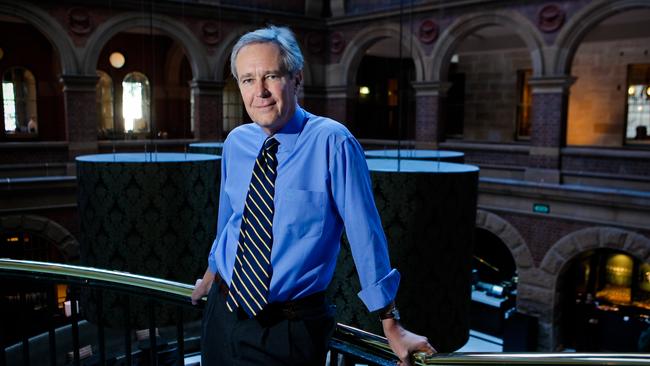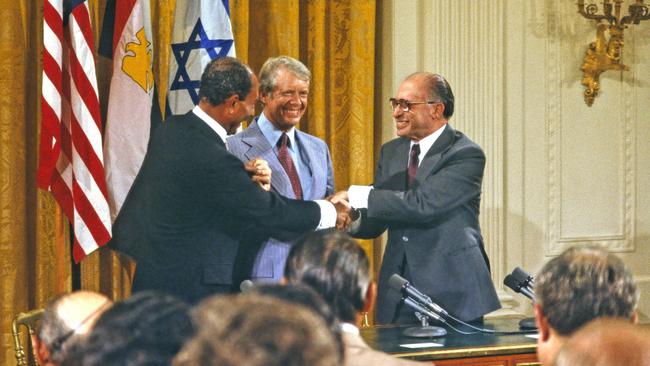White House speechwriter recalls front-row seat to Jimmy Carter’s presidency
Ex-speechwriter James Fallows recalls the 39th US president as a man of principle and a ‘master of detail’.

James Fallows was just 26 when he joined Jimmy Carter’s campaign for president in the US summer of 1976. He had studied politics, history and literature at Harvard and edited The Harvard Crimson. What attracted him to Carter, the outsider former southern governor, was character.
“I thought he was somebody who had the right moral tone for the US coming out of Watergate, just barely recovered from the Vietnam War and the beginning of a lot of economic turmoil,” Fallows, 75, tells Inquirer.
“So, he seemed to be the right person for those times.”
Carter, the man born in the small rural town of Plains, Georgia, and who died there this week at age 100, was a longshot when he announced his candidacy in December 1974. A newspaper ran the headline: “Jimmy Who Is Running for What!?” He told them again and again: “My name is Jimmy Carter and I’m running for president.” By January 1976, Carter had 4 per cent support in polls. He was the Democratic nominee by July that year.

The campaign for president was launched after the resignations of president Richard Nixon and vice-president Spiro Agnew. Gerald Ford, a decent and humble man, had been sworn in as president and was running for re-election. When Ford pardoned Nixon, the former never really recovered, although the 1976 election would be close-run.
“Carter was a religious person, a man of faith, a man of principle,” Fallows recalls. “It had a lot of electric power for the country in those days. The other was the power of his background, which affected me and other people, which was that he was a small-town person, a peanut farmer, a naval veteran, somebody who was not from the normal avenues for politics.”
Fallows signed on to write speeches for Carter and would be chief speechwriter in the White House for almost two years, from January 1977 until November 1978. The first major task was Carter’s inaugural address.
The president-elect was the first to stay at Blair House, the presidential guesthouse, the night before his inauguration. He ate a breakfast of scrambled eggs before attending a Baptist church service and meeting Ford for coffee at the White House. He would be sworn-in as “Jimmy” rather than “James” Carter.
The speech was notable for two reasons. First, it was short at less than 15 minutes. And second, the new president thanked his predecessor “for all he has done to heal our land”. The 39th president spoke of “a new spirit” and “new beginning” for America.
The pardon of Nixon, says Fallows, was an “electoral weakness” for Ford and an “electoral plus” for Carter. Fallows and Carter discussed mentioning Ford in the address and worked together to find the right formulation. It was an act of grace and civility towards a defeated opponent.
“Carter was reflecting what Ford had done; as we say in the US, he had taken a hit for the team,” Fallows says. “He had done something that, in my view, was appropriate for the country but it was bad for Ford. And Carter was thanking him for that. I thought it was very important.”
In some ways the presidency changed Carter – who was in the White House for a single term, from 1977 to 1981 – though not in others. Fallows had a front-row seat to Carter’s governing style, which came in for criticism at the time. The president was not a Washington veteran; he had served previously as governor of Georgia (1971-75) and in the Georgia Senate (1963-67). The presidency is entirely different.
“One of the things I learned by working in the White House was that any decision a president has to make or guesstimate is by definition an impossible decision,” Fallows says. “Because an easy decision would have been made by somebody else along the line. So these are all impossible decisions. I remember seeing him trying to evaluate these choices with intense focus and an analytical approach. The part of him that did not change was being very independently minded and outsider-ish, and a morally firm person, and thinking he knew what was right and wrong. He knew who he respected and did not, and he knew in which direction the country should go.
“And so, I think that certainty of view was both his strength as president and his weakness in the long run.”
Carter, it was said, could be a details person and a micromanager at times. He would spend hours, days, reading detailed reports, asking questions of advisers, seeking information, before making a decision. “He was superb at analysing situations,” Fallows says. “The time when his ability to immerse himself in detail that was most consequential was the Egypt-Israel negotiations.”
The 1978 peace accord between Israel and Egypt that he negotiated across 13 days at Camp David with Israeli prime minister Menachem Begin and Egyptian president Anwar Sadat is an example of that mastery of detail paying a lasting dividend. It is Carter’s finest achievement, a landmark of his presidency, and rightly earns him the title of peacemaker.

Where Carter’s attention to detail could be excessive is the legend that he personally managed the booking sheet for the White House tennis courts. The story apparently originated with Fallows, a keen tennis player. He did not want to confirm or deny the truth of it other than to say: “I did play on those courts and I will say that Carter was a master of detail.”
No president or prime minister climbs to the highest office without already being a good communicator before enlisting the services of a wordsmith.
Carter was very effective in speaking to small groups and could strike a chord with his audience. This is a key reason he convinced primary voters to support his candidacy in 1976.
He was also a good memoirist. He wrote dozens of books on many topics but the ones that were especially so include his campaign autobiography, Why Not the Best? (1975), Turning Point (1992), An Hour Before Daylight (2001) and A Full Life (2015). He kept a diary in the White House and wrote a memoir of his presidency published in 1982.
But speechwriting is different. It can be a curse for political leaders who are reluctant to let their speechwriters work their magic and often over-invest themselves in the time-consuming process.
This often was Fallows’ experience with Carter. The result is usually worse than what was drafted for them. But some leaders do not like others putting words into their mouths. “He was difficult to work with on speeches,” Fallows acknowledges. “He was, to my taste, not as good in what we think of as formal speechwriting. The more important the speech, the more time he would spend on it, and often that was to his detriment.”
The Carter presidency came at a time of economic challenge at home, namely inflation and unemployment, and turmoil abroad with an energy crisis and terrorism. Carter led the way with economic deregulation. He tried to shift US energy policy. He made human rights a priority. The Iran hostage crisis and botched rescue mission in April 1980 was a disaster. “It was a very difficult time to be president,” Fallows says.
“He was extremely lucky to become president. Lots of things had to break his way for that to happen. People decided not to run for the Democratic nomination such as Ted Kennedy, Jerry Brown and Sargent Shriver. But he was extremely unlucky as president. The Iran hostage crisis happened. There was 21 per cent interest rates. He didn’t cause those.
“He was overwhelmed by a lot of what was going on in those days, as many other leaders in the 1970s were. I think he was fortunate to have lived so long, more than 40 years as ex-president, to see the things that he actually achieved be reconsidered, from deregulation to environmental policy, the Panama Canal Treaty, to the Camp David Accords.”
In November 1978, Fallows quit the White House. The following May, he wrote an explosive article for The Atlantic, titled “The Passionless Presidency: The Trouble With Jimmy Carter’s Administration”. It was insightful and prescient about Carter’s problems.
“Like other people who have been speechwriters, I found it a natural and easy thing to do,” he says. “But I didn’t like doing it. And so I felt I was very fortunate in my mid-20s to have this opportunity but I thought I would be better suited for the world and for myself to be writing magazine pieces and books. Also, I felt as if there was increasing friction between me and the momentum of the administration, which I had been trying to register internally and then registered externally when I left. I was glad to have done it but I did not want to do it any more.”
He does not have any regrets about writing the piece for The Atlantic, which was harsh but stands up today. “My hope was that if fortune had changed for Jimmy Carter and his team, that he would be able to become a more successful president in the second half of his first term, which he came surprisingly close to realising.”
Carter never hid his Baptist faith. The morals that guided him in life also steered his approach to politics. He wrote about religion, lectured about spirituality and taught Sunday school. Fallows says he has thought a lot about how Carter blended his personal beliefs with public duties.
“On the one hand, Carter was, as president, a very cold-blooded, dispassionate, clinical analyser of what was good for the country, what was good for him, what he had to do, what he didn’t want to do,” Fallows says. “Nobody could exceed his rationality.
“On the other hand, he was then and has been a person of really surpassing religious faith. He really did believe in the long-term messages of Christianity and that there are lasting penalties and rewards for one’s actions on Earth. And that has been a very important part of his time in public office and after.”
In his long life, Carter showed that character matters. He was a man of empathy and integrity, sustained by his spiritualism and devotion to serving others. His work did not end with the presidency. He continued to help the poor and the sick, to try to resolve conflicts and free hostages, and monitored democratic elections. Carter was an exemplar of moral leadership.
“He has established a standard against which other people in the role of former president can be measured,” Fellows says. “And it all is a matter of principle and character and a sense of what one should do. With privilege comes responsibility. I think he tried to live the message of that maxim.”




To join the conversation, please log in. Don't have an account? Register
Join the conversation, you are commenting as Logout